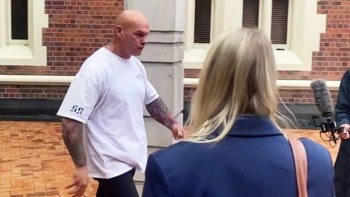
- Auckland pensioner Andrew Che Sit Bong mistakenly sent $158,000 to the wrong account.
- The recipient allegedly spent the money on cars and transfers, leading to potential theft charges.
- Che seeks recovery through potential police and civil action, with support from MPs.
A woman who went on an alleged “spending spree” after mistakenly receiving $158,000 in a bank transfer error has no right to the money and could be prosecuted for theft, a legal expert says.
Retired Auckland University law professor Bill Hodge says while it is not a crime to find someone’s wallet, “if there’s identification, and you take the money out and you throw the wallet away, you’re stealing the money”.
Mt Roskill pensioner Andrew Che Sit Bong, 78, accidentally sent his retirement savings to the wrong account number when transferring money back to New Zealand from a United Kingdom bank.
When entering payment instructions for his own Westpac account in January last year, the retired electrical engineer accidentally missed out one digit - meaning his money landed in the account of an Auckland mother-of-five.
While Westpac was able to recover $28,000, police told Che the woman used the rest of the money to purchase two cars, transfer $60,000 to her boyfriend, and send $20,000 to a relative in Samoa.
Westpac repeatedly contacted the woman in a bid to return the money, telling Che “the wrongful recipient understands the severity of the situation and are aware that the police at some stage may be contacted”.
Hodge said in his view, the woman’s actions indicated she was aware that what she was doing was wrong and he believed she could face criminal charges.
“If you’re innocently possessing someone else’s property, then you’re not a thief. But if you have knowledge that you wrongfully got it, then you meet the criminal standard of knowledge, or what we call ‘mens rea’.
“So the police could be looking at this and she should get a visit.”
Hodge said the so-called “finders keepers” rule was a misnomer and didn’t apply.
“She doesn’t get good title to something that was accidentally put in her account.
 Retired Auckland University law professor Bill Hodge says the 'finders keepers' rule does not apply.
Retired Auckland University law professor Bill Hodge says the 'finders keepers' rule does not apply.
“In practice, if you find something you keep it. But the true owner retains title to something that was lost.”
If police were to prosecute the woman, she could face a theft charge and be looking at potential jail time, Hodge said.
The victim could consider civil proceedings in order to confiscate assets purchased with his money. Police could also go after the assets as proceeds of crime.
“If the victim can instruct a solicitor quickly before the assets get further dissipated, they can put freezing orders on any assets and maybe get the bailiff to seize the car.”
However, civil proceedings could be costly, Hodge warned.
“Gee whiz, you’re looking at $10,000 just to get started in the district court.”
Victim missed single digit when entering payment instructions
The account number provided to Westpac had only 15 digits, not the intended 16, so Westpac added a zero to the suffix as per its usual protocols.
Che only realised his error two months later. Westpac immediately froze the woman’s account.
Westpac refused to disclose the woman’s name to Che due to privacy, but eventually gave it to police after being served court production orders.
Che says officers are now preparing to interview the woman and her boyfriend and he hopes she will face criminal charges.
Andrew Che Sit Bong acknowledges making the bank transfer error but believes Westpac is also liable for not cross-checking the recipient name and account. Photo / Michael Craig
“Their happiness is built on my misery.
“I am a pensioner and I am unable to work. I need this money ... through my old age and I am devastated.”
While he acknowledges making the account error, he blamed Westpac for not checking that the name provided on payment instructions and the bank swift code matched that of the recipient account.
He also believed the missing suffix number should have prompted extra scrutiny by Westpac and was a missed opportunity to prevent his loss.
Westpac denied liability and suggested Che contact police and consider taking civil proceedings.
Che contacted police last year but they refused to investigate, telling him it was a civil dispute.
Victim turns to local MPs after failed attempts to recoup cash
Frustrated by the lack of action, Che turned to his local MPs.
Carlos Cheung, National MP for Mt Roskill, swung into action for his constituent. He contacted police and convinced them in September to re-examine Che’s file.
Meanwhile, Labour list MP Camilla Belich wrote to Westpac CEO Catherine McGrath last month highlighting the “unjust and unfair situation” of an elderly man losing his retirement savings in such unfortunate circumstances.
Belich said best practice suggested the bank should have checked the recipient account name matched the account number. She called on Westpac to act in Che’s interests and find a way to rectify the situation.
 The money was accidentally sent to the wrong Westpac account.
The money was accidentally sent to the wrong Westpac account.
A Westpac NZ spokeswoman said the bank had assisted Che in trying to recover the money.
“That has included freezing funds in the recipient’s account, contacting [the overseas bank], encouraging Mr Che to contact police, communicating with the recipient on his behalf and offering him assistance to take a civil case to recover his money.”
While a confirmation of payee name matching service was being rolled out by NZ banks, this was not available for international payment.
Lane Nichols is Auckland desk editor for the New Zealand Herald with more than 20 years’ experience in the industry.
Take your Radio, Podcasts and Music with you









